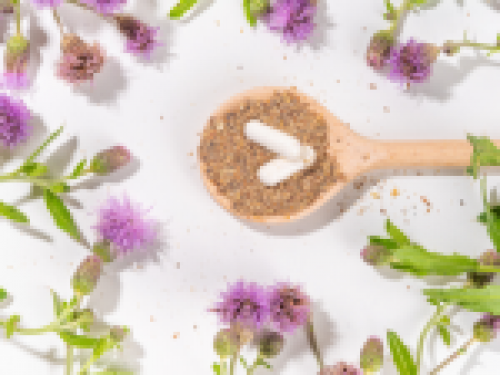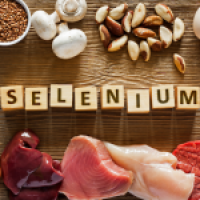How Milk Thistle Supports Liver Health

Milk Thistle: The Liver-Supporting Supplement
Your liver is one of the hardest-working organs in your body. It filters toxins, processes nutrients, supports digestion, and plays a major role in overall health. But with today’s exposure to environmental toxins, processed foods, alcohol, and medications, the liver can become overworked and sluggish.
At Intentional Wellness, Inc., I take a functional medicine approach to liver health, helping clients reduce toxin overload and support the liver with powerful natural remedies like milk thistle. If you’ve been looking for a natural way to improve liver function and detoxification, milk thistle may be the missing piece.
What is Milk Thistle?
Milk thistle (Silybum marianum) is a flowering plant in the daisy family that has been used for centuries to support liver health. Its purple flowers and spiky green leaves with milky-white veins make it easy to recognize.
The active ingredient in milk thistle is silymarin, a powerful antioxidant and anti-inflammatory compound that helps protect, repair, and regenerate liver cells. This is why milk thistle is commonly used to support people with liver damage, fatty liver disease, and toxin exposure.
How Milk Thistle Supports Liver Health
Milk thistle has been widely studied for its liver-protective benefits, making it one of the most well-researched supplements for liver function. Here’s how it works:
Powerful Antioxidant Protection
- The liver is constantly exposed to toxins that generate free radicals, which can damage cells.
- Silymarin neutralizes these harmful free radicals, protecting liver cells from damage.
Reduces Liver Inflammation
- Many liver conditions, including fatty liver disease and hepatitis, are driven by chronic inflammation.
- Silymarin helps reduce inflammation in the liver, allowing it to function more efficiently.
Supports Liver Detoxification
- The liver has two phases of detoxification to break down and eliminate toxins.
- Milk thistle helps boost detox enzymes, improving the liver’s ability to process and remove harmful substances.
Helps the Liver Regenerate
- The liver is one of the only organs that can regenerate itself—but it needs support.
- Silymarin stimulates the growth of new liver cells, helping to repair damage from toxins, alcohol, and medications.
Protects Against Liver Damage
- Liver damage can result from toxins, heavy metals, alcohol, and medications like acetaminophen (Tylenol).
- Studies show that milk thistle protects the liver from these harmful substances and may help prevent liver scarring (fibrosis).
Scientific Research on Milk Thistle and Liver Health
Milk thistle has been studied in both traditional and clinical settings, with promising results for liver function.
Chronic Liver Disease
- Research shows that milk thistle can improve liver enzyme levels in people with chronic liver conditions like cirrhosis and hepatitis.
Non-Alcoholic Fatty Liver Disease (NAFLD)
- NAFLD is one of the most common liver disorders, often linked to insulin resistance and metabolic syndrome.
- Studies show that silymarin can help reduce fat buildup in the liver and improve insulin sensitivity.
Alcoholic Liver Disease (ALD)
- Excessive alcohol use can lead to inflammation, oxidative stress, and liver damage.
- Milk thistle has been shown to reduce alcohol-induced liver injury by lowering inflammation and preventing scarring.
Liver Cancer Prevention
- Early research suggests that silymarin may help slow tumor growth and trigger cell death in liver cancer cells, though more studies are needed.
How to Use Milk Thistle for Liver Support
If you want to add milk thistle to your daily routine, here are some important tips to get the best results:
Choose a High-Quality Supplement
- Look for standardized extracts containing at least 70-80% silymarin for potency.
- Avoid low-quality supplements that may contain fillers or unnecessary additives.
Follow the Recommended Dosage
- The typical dosage of milk thistle extract is 150–300 mg per day for general liver support.
- Higher doses (600 mg or more) may be used for therapeutic purposes under medical guidance.
Be Patient and Stay Consistent
- Like many natural remedies, milk thistle works best when used consistently over time.
- Some benefits may take several weeks to months to become noticeable.
Support Your Liver with Healthy Lifestyle Choices
- Eat a clean, whole-foods diet rich in vegetables, healthy fats, and lean protein.
- Stay hydrated to help flush toxins from the liver.
- Limit alcohol, processed foods, and sugar, which can put extra strain on the liver.
Milk Thistle:
A Functional Medicine Approach to Liver Health
In today’s world, the liver is constantly under stress from environmental toxins, medications, and poor diet choices. Instead of waiting for liver issues to develop, functional medicine focuses on supporting liver function proactively.
At Intentional Wellness, Inc., I help clients:
- Identify signs of liver dysfunction early.
- Create a personalized liver-supporting nutrition and supplement plan.
- Reduce toxin exposure and improve overall liver function naturally.
Want to optimize your liver health?
Let’s work together.
Schedule a consultation today!
References
-
“Milk thistle – Mayo Clinic.” Mayo Clinic, www.mayoclinic.org/drugs-supplements-milk-thistle/art-20362885.
-
Saller, R., et al. “Milk thistle for the treatment of liver disease: A systematic review and meta-analysis.” American Journal of Medicine, vol. 113, no. 6, 2002, pp. 506-515, www.sciencedirect.com/science/article/abs/pii/S0002934302012445.
-
“Milk Thistle Information | Mount Sinai – New York.” Mount Sinai, www.mountsinai.org/health-library/herb/milk-thistle.
-
Saller, R., et al. “Milk thistle for the treatment of liver disease.” American Journal of Medicine, vol. 113, no. 6, 2002, www.amjmed.com/article/S0002-9343(02)01244-5/abstract

Further Reading on Supplements:
- How Magnesium Helps Your Body
- Ubiquinol / CoQ10 Benefits and Side Effects
- Health Benefits of Taurine
- Could Your Pain Be Caused by a Vitamin D Deficiency?
- B Vitamins: Essential Nutrients for Optimal Health
- Can B6 Cause Neuropathy?
- Sulforaphane, Mitochondria, and Oxidative Stress
- Functions of Lysine in the Body
- What are Adaptogens and How Do They Work?
- How Milk Thistle Supports Liver Health
- What Does L-Carnitine Do for the Body?
- Glutathione: The Master Antioxidant
- TUDCA for Liver and Gallbladder Health
- Health Benefits of Alpha Lipoic Acid (ALA)
- Benefits of Black Seed Oil
- Understanding Polyphenols: Nature’s Potent Health Allies



